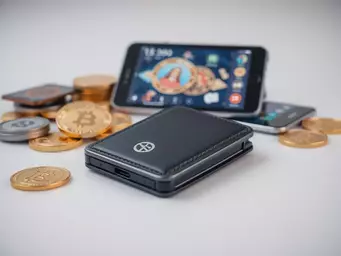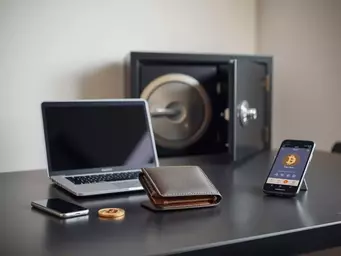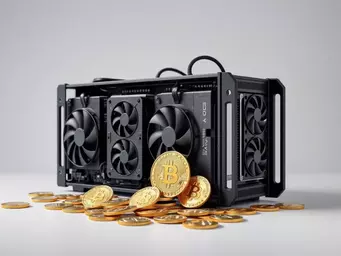Benefits
- ✓Instant Access
- ✓User-Friendly
- ✓Exchange Integration

Are you aware of the differences between hot wallets and cold wallets in the cryptocurrency world? Understanding these distinctions can empower you to choose the right storage solution for your digital assets.
This visual summarizes the key differences between hot and cold cryptocurrency wallets, comparing their accessibility, security, and typical use cases.
Designed for frequent transactions and immediate access, connected to the internet.
Offline storage for enhanced security, ideal for larger amounts over extended periods.
As someone passionate about making cryptocurrency accessible, I often get asked about the different types of wallets available in the Bitcoin ecosystem. Understanding the distinction between hot wallets and cold wallets is crucial for anyone venturing into the world of digital currencies. In this section, we'll break down these wallet types, their features, and how they can be used effectively. For a comprehensive overview of hot vs. cold crypto wallets, you can refer to resources like Ledger Academy's guide.
Hot wallets are designed for convenience and immediate access to your Bitcoin and other cryptocurrencies. These wallets are connected to the internet, making them ideal for quick transactions. Think of hot wallets as your online banking app—they offer easy access but come with certain risks. If you're looking to make frequent trades or send money to friends, hot wallets are a great choice! These online wallets are often highlighted for their ease of use, as discussed in reports on decoding crypto safety.
These benefits make hot wallets a popular choice for everyday transactions. However, it's essential to maintain good security practices, as their online nature can expose them to potential threats.
When it comes to choosing a hot wallet, there are plenty of options! Some of the most popular include:
Each of these wallets has unique features, so it's worth exploring which one fits your needs best.
Mobile wallets offer an amazing level of convenience for users. With apps available for both Android and iOS, you can manage your cryptocurrencies from anywhere! This flexibility is particularly beneficial for users who make frequent transactions or need to access their funds quickly. Just remember to always secure your mobile device with strong passwords and biometric locks to keep your assets safe.
Cold wallets are the polar opposite of hot wallets. They are not connected to the internet, which significantly enhances their security. Cold wallets are excellent for storing larger amounts of cryptocurrency for extended periods. Think of them as your long-term savings account in the digital currency world. For more details on the security advantages of cold wallets, Cobo's insights on cold wallets provide valuable information for both exchanges and users.
These advantages make cold wallets a popular choice for serious investors looking to protect their assets over time.
There are primarily two types of cold wallets: hardware wallets and paper wallets. Hardware wallets are physical devices, like a USB drive, where you can securely store your private keys offline. On the other hand, paper wallets involve printing out your keys and storing them safely. Each type serves the purpose of protecting your cryptocurrency, but they come with different considerations regarding usability and security.
When it comes to hardware wallets, Ledger and Trezor are two of the most well-known brands. Here's a quick comparison:
| Feature | Ledger | Trezor |
|---|---|---|
| Price | Varies by model, generally affordable | Generally slightly higher |
| Supported Coins | Supports a wide range of cryptocurrencies | Also supports various currencies, but slightly fewer than Ledger |
| User Experience | User-friendly interface | Simple and intuitive |
Choosing between Ledger and Trezor often comes down to personal preference, as both are reliable options for keeping your cryptocurrencies safe.
Hot wallets are connected to the internet and are ideal for frequent transactions due to their convenience and instant access. Cold wallets are offline, offering enhanced security for long-term storage of larger amounts of cryptocurrency, as they are less susceptible to online hacks.
Hot wallets provide instant access to your cryptocurrencies, are generally user-friendly, and often integrate seamlessly with cryptocurrency exchanges, making them suitable for frequent trading and everyday spending.
Cold wallets offer enhanced security by storing your assets offline, making them ideal for long-term storage and large investments. They provide peace of mind by protecting your digital assets from cyber threats.
Mobile wallets are a type of hot wallet. While they offer convenience for on-the-go management of cryptocurrencies, they are connected to the internet and therefore carry the inherent risks of online wallets. Users should always secure their mobile devices with strong passwords and biometric locks.
Choosing the right wallet depends on your individual needs for accessibility versus security. If you trade frequently or use crypto for daily transactions, a hot wallet may be suitable. For long-term investments and safeguarding significant assets, a cold wallet is recommended. Consider your investment strategy and how often you need to access your funds.
As you consider the best wallet for your cryptocurrency needs, we want to hear from you! Which type of wallet do you prefer for managing your digital assets?
As we've explored the world of cryptocurrency wallets, it's clear that both hot wallets and cold wallets serve unique purposes in managing your digital assets. Hot wallets are designed for daily transactions and easy access, but they come with certain security risks. On the other hand, cold wallets provide a secure storage option for those looking to hold assets long-term. Understanding these differences can help you make informed decisions about your crypto management strategy!
When deciding between hot and cold wallets, remember that each type has its own strengths and weaknesses. Hot wallets offer convenience, making it simple to access and trade your assets. Yet, this convenience can expose you to various online threats. Conversely, cold wallets provide robust security features, ideal for long-term storage. However, they require more effort for access and management. Finding the right balance between usability and security is crucial!
As you evaluate your choices, consider your specific needs and how often you plan to access your funds. This understanding will guide you toward the most suitable wallet option that aligns with your investment strategy.
Choosing the right wallet isn't a one-size-fits-all approach. Here are some tailored recommendations to consider:
By considering these factors, you can ensure that your chosen wallet meets your specific cryptocurrency needs. Remember, protecting your assets is just as important as acquiring them!
Now that you have a clearer understanding of wallets, it's vital to implement best practices for security. Here are some steps to enhance your protection:
Taking these precautions can significantly reduce the risk of losing your assets, enhancing your overall crypto experience.
Your journey doesn’t stop here! Engaging with the crypto community can provide valuable insights and support. Consider joining forums, attending webinars, or following reputable crypto educators like myself at How Does Bitcoin Work. We're here to simplify the complex world of Bitcoin for you!
Building connections in the crypto community can help you navigate challenges and stay informed about trends.
Finally, it’s essential to recognize the inherent volatility in the cryptocurrency market. Prices can fluctuate wildly, which means having a solid trading strategy is crucial. Here are a few tips to keep in mind:
Understanding these aspects of the market will empower you to make informed decisions as you manage your investments. Remember, this is a journey, and learning is a continuous process—let's embrace it together!
Here is a quick recap of the important points discussed in the article:
Bitcoin Wallets in DeFi and NFTs

As the world of cryptocurrency rapidly evolves, understanding Bitcoin wallets is more crucial than e
Secure Your Bitcoin Investments Today

What if I told you that securing your Bitcoin investment could be as crucial as choosing the right a
Bitcoin Mining's Role in Security

What if I told you that Bitcoin mining is not just about creating new coins but is a cornerstone of
Bitcoin Wallets in DeFi and NFTs
Secure Your Bitcoin Investments Today
Bitcoin Mining's Role in Security
Recovering Your Lost Bitcoin Keys
The Importance of Bitcoin Today